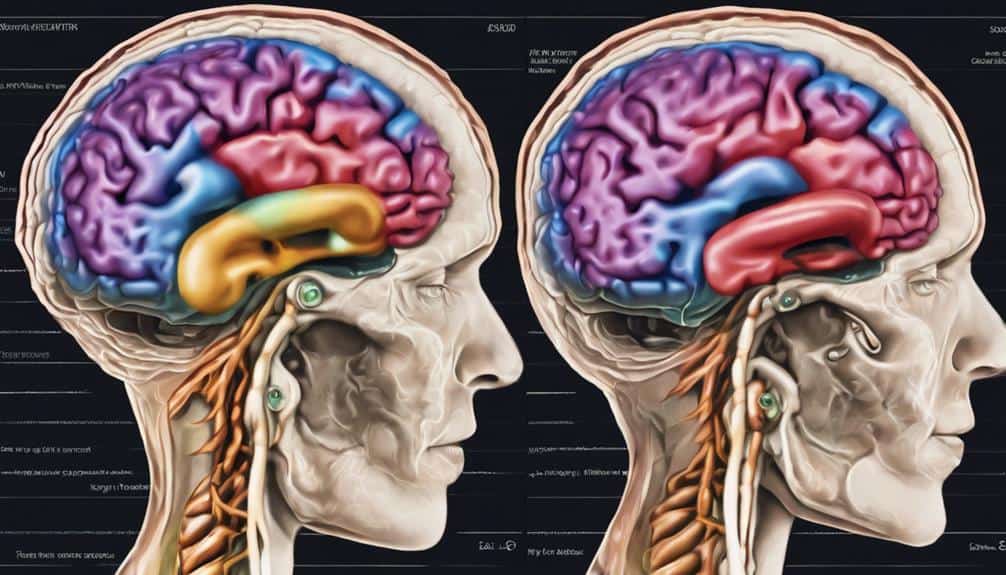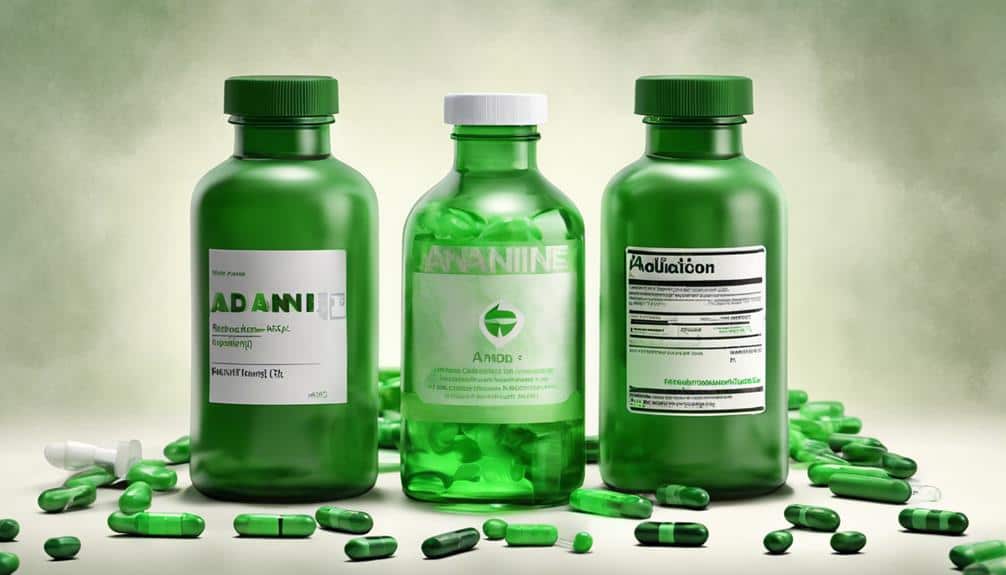Theanine Adhd
As I sat in a bustling coffee shop, trying to focus on my work amidst the noise and distractions, I couldn't help but wonder about the potential of theanine for ADHD.
The idea that a simple amino acid found in tea could possibly help with attention and concentration issues intrigued me. Could this natural compound be the missing piece in managing ADHD symptoms?
The research seems promising, but there's still so much more to uncover about theanine's role in addressing the complexities of ADHD.
Key Takeaways
- L-theanine from tea leaves can enhance concentration and focus in managing ADHD symptoms.
- The calming effect of theanine helps with hyperactivity in individuals with ADHD.
- Research supports theanine's positive impact on attention, focus, and cognitive performance in ADHD.
- Proper theanine dosage under healthcare provider guidance is crucial for safe and effective ADHD management.
Theanine and ADHD: What You Need to Know

What role does L-theanine play in the management of ADHD symptoms and cognitive performance enhancement?
L-theanine, a compound found in tea leaves, has garnered attention for its potential benefits in individuals with ADHD. Research suggests that L-theanine may help improve concentration and focus, which are common challenges for those with ADHD. Additionally, when combined with caffeine, L-theanine has shown promise in enhancing cognitive performance in individuals with ADHD. This combination may offer a synergistic effect, providing a boost in cognitive function.
Moreover, L-theanine is being explored for its ability to manage ADHD symptoms as a complementary treatment. Some studies and anecdotal evidence indicate that L-theanine could also aid in addressing sleep disturbances often experienced by individuals with ADHD. While current research is encouraging, more thorough studies are necessary to fully understand the impact and effectiveness of L-theanine for ADHD.
The potential of L-theanine in supporting cognitive function and managing ADHD symptoms warrants further investigation to provide clearer insights into its benefits.
Understanding Theanine Benefits for ADHD

Exploring the potential benefits of L-Theanine for ADHD involves investigating its impact on attention, focus, and cognitive performance in individuals with the disorder. When considering the benefits of L-Theanine for ADHD, it's essential to understand its effects on various aspects of cognitive function and symptom management:
- Calming Effect: L-Theanine has been shown to have a calming effect, which may help individuals with ADHD manage hyperactivity and impulsivity.
- Improved Attention and Focus: Research suggests that L-Theanine may enhance attention and focus, potentially aiding individuals with ADHD in staying on task and increasing productivity.
- Better Cognitive Performance: Studies indicate that L-Theanine could potentially improve cognitive performance, such as memory and learning abilities, in individuals with ADHD.
Before incorporating L-Theanine into an ADHD management plan, consulting with a healthcare provider is important to determine the appropriate dosage, assess potential interactions with other medications, and ensure its safe use.
Research on Theanine for ADHD

Research on the benefits of theanine for ADHD has shown promising results in improving concentration and cognitive performance in individuals with ADHD.
Studies have indicated changes in brain regions associated with distraction, as well as enhanced cognitive test scores in boys with ADHD.
The combination of theanine with caffeine may further enhance these benefits by improving concentration and thinking abilities.
Theanine Benefits for ADHD
L-Theanine demonstrates potential benefits in enhancing concentration, focus, and cognitive performance for individuals diagnosed with ADHD. When considering the use of L-theanine for ADHD, it's vital to understand its effects on both children and adults.
Here are key points to take into account:
- Research suggests that L-theanine, particularly in combination with caffeine, can improve attention and cognitive function in individuals with ADHD.
- Studies indicate that L-theanine may offer complementary benefits to standard ADHD treatments.
- Consulting a healthcare provider before incorporating L-theanine into an ADHD management plan is critical for determining appropriate dosages and ensuring safety.
It is important to approach the use of L-theanine for ADHD as a potential adjunct to existing therapies under professional guidance.
Theanine Research Findings
In recent studies investigating the effects of L-theanine on individuals with ADHD, notable improvements in concentration and focus have been observed, suggesting potential benefits in managing ADHD symptoms.
Research indicates that L-theanine, particularly when combined with caffeine, may enhance cognitive performance, sustained attention, and decrease impulsivity in individuals with ADHD. A 2020 study demonstrated changes in brain regions associated with distraction and improved cognitive test scores in boys with ADHD following L-theanine administration.
The combination of L-theanine and caffeine shows promise in improving ADHD symptoms and reducing the necessity for other medications. Overall, the research findings suggest that L-theanine, either alone or with caffeine, could be a valuable adjunct in the management of ADHD symptoms, offering potential benefits in concentration, focus, and cognitive performance.
Theanine Dosage for ADHD
A recommended dosage of L-theanine for children with ADHD is around 2.5 mg/kg. When considering L-theanine dosage for ADHD treatment, it's important to consult with a healthcare provider to determine the appropriate amount.
Green tea, a natural source of L-theanine, can offer potential benefits for managing ADHD symptoms. Research suggests that L-theanine may positively impact cognitive performance, including sustained attention and inhibitory control in children with ADHD.
While adults commonly take around 200 mg of L-theanine, the best dosage for managing ADHD symptoms is still under investigation. Hence, seeking guidance from a healthcare provider is essential to guarantee the safe and effective use of L-theanine for treating ADHD.
Theanine Dosage for Managing ADHD

When considering the management of ADHD symptoms, determining the appropriate dosage of L-theanine is essential for best effectiveness and safety. For children, a recommended dosage of around 2.5 mg/kg is suggested, while adults may benefit from a dosage of 200 mg.
It's important to note that dosing of L-theanine lacks standardization due to limited rigorous testing, underscoring the importance of consultation with a healthcare provider. Green tea serves as a natural source of L-theanine, potentially offering benefits for alleviating ADHD symptoms.
Research indicates that combining L-theanine with caffeine may provide added advantages in managing ADHD symptoms. As such, consulting a healthcare provider is paramount to establish the suitable dosage and ensure the safe use of L-theanine for ADHD management.
Theanine Vs. ADHD Medications

In comparing L-Theanine to traditional ADHD medications, it's essential to contemplate their effectiveness and potential side effects.
While L-Theanine may offer benefits in improving attention and focus, it's important to note that it isn't a replacement for standard ADHD medications.
Combining L-Theanine with prescribed ADHD medications under healthcare provider guidance could potentially enhance treatment outcomes.
Theanine Effectiveness in ADHD
Research suggests that L-theanine may offer potential benefits in improving attention and cognitive function in individuals with ADHD when compared to traditional ADHD medications. When considering the effectiveness of L-theanine in ADHD, the following points are vital:
- Studies indicate that L-theanine can enhance attention and reduce impulsivity in children with ADHD.
- Combining L-theanine with caffeine has shown to improve sustained attention and cognitive performance.
- L-theanine, while not a standalone replacement for ADHD medications, can complement existing treatments effectively.
Incorporating L-theanine into ADHD management may provide additional advantages in addressing attention deficits and cognitive challenges. Further research is essential to solidify these findings and establish the full extent of L-theanine's benefits in managing ADHD symptoms.
Side Effects Comparison
Preliminary investigations indicate minimal side effects associated with L-theanine use, contrasting with the common adverse effects linked to ADHD medications. While one reported case of facial tics in a child was observed with L-theanine, symptoms ceased upon discontinuation. In contrast, ADHD medications often lead to side effects such as insomnia, loss of appetite, headaches, mood swings, and increased heart rate.
Caution is advised when considering L-theanine due to limited data on side effects and drug interactions, necessitating further research. Studies with healthy adults have shown no adverse effects with L-theanine, suggesting mild side effects at most. On the other hand, risks associated with ADHD medications encompass potential abuse, growth suppression in children, cardiovascular issues, psychiatric side effects, and the possibility of developing tolerance and dependence.
Potential Side Effects of Theanine

With limited research available, few side effects of L-theanine have been reported, including a case of facial tics in a child that resolved upon discontinuation. When contemplating the potential side effects of Theanine, it's essential to approach its usage with caution due to the limited data on its effects and drug interactions.
Some key points to contemplate are:
- Limited Side Effect Data: Research suggests mild side effects associated with L-theanine use, with one reported case of facial tics that disappeared upon discontinuation.
- Need for Caution: The scarcity of thorough research on the potential risks of L-theanine underscores the importance of exercising caution when incorporating it into one's regimen.
- Consult Healthcare Provider: Before starting L-theanine, consulting a healthcare provider is paramount to determine the appropriate dosage, understand potential side effects, and assure overall safety.
Given the lack of extensive research, it's essential to proceed with prudence and seek professional guidance to navigate the potential effects and risks associated with Theanine use.
Integrating Theanine Into ADHD Treatment

Integrating L-theanine into ADHD treatment can potentially enhance focus, concentration, and attention in individuals with ADHD. Research indicates that L-theanine, particularly when paired with caffeine, may improve cognitive performance and sustained attention among those with ADHD.
As a complementary treatment to traditional ADHD medications, L-theanine can play a significant role in managing ADHD symptoms. When used alongside standard medications, L-theanine has shown promise in reducing impulsivity and enhancing cognitive function in individuals with ADHD.
It's essential to consult a healthcare provider before incorporating L-theanine into ADHD treatment to determine proper dosages and guarantee safety. By integrating L-theanine into ADHD treatment plans, individuals may experience a more inclusive approach to managing their symptoms, potentially leading to improved cognitive performance and better overall quality of life.
Frequently Asked Questions
Does L-Theanine Increase Dopamine?
Yes, l-theanine increases dopamine levels in the brain, which can enhance mental focus, cognitive performance, and mood. It aids in stress relief, anxiety reduction, and energy levels while improving concentration. This modulation supports brain function.
What Are Natural Stimulants for ADHD Adults?
Natural stimulants for ADHD adults include caffeine alternatives like L-theanine in green tea, mindfulness techniques such as meditation and yoga, exercise benefits for dopamine regulation, herbal remedies, diet changes, and cognitive therapy, all aiding focus and attention.
Who Should Not Take Theanine?
I should not take theanine if I have low blood pressure, allergies to theanine or green tea, or if I'm pregnant or breastfeeding. It's important to consult a healthcare provider if I'm on sedatives, stimulants, or blood pressure medications before using theanine.
How Do You Treat ADHD Without Adderall?
To address ADHD without Adderall, one can explore herbal remedies, mindfulness techniques, dietary changes, exercise benefits, cognitive therapy, meditation practices, sleep patterns, stress management, behavioral therapy, and lifestyle adjustments. These avenues offer diverse approaches for managing symptoms effectively.
Conclusion
Conclusively, while research on L-theanine for ADHD shows promising results in improving symptoms such as concentration and focus, more thorough studies are needed to fully understand its efficacy.
Anecdotal evidence suggests that L-theanine may complement existing ADHD treatments, but conclusive evidence on its effectiveness as a standalone therapy is still lacking.
Further research is necessary to determine the true potential of L-theanine in managing ADHD symptoms.







